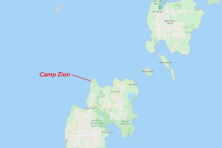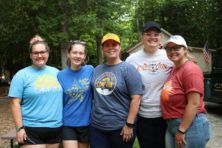Camp Zion Takes Expansion Plans to Federal Court
- Share
- Tweet
- Pin
- Share
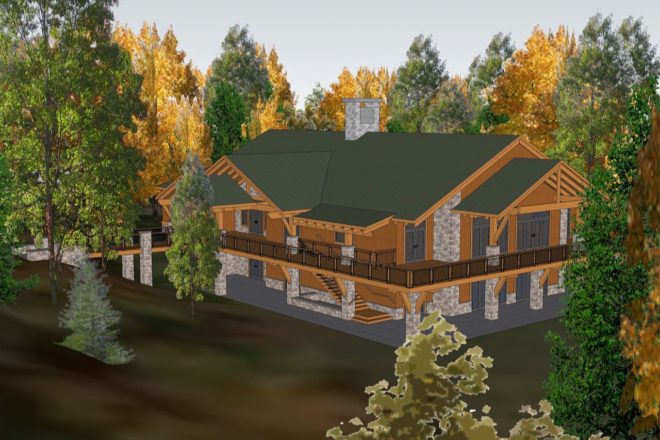
Ellison Bay retreat aims to build new dining hall, conference rooms
For 74 years Camp Zion has gone all but unnoticed by most residents of Door County. Even those who live within a few miles may not know it exists. But the camp, tucked along the Green Bay shore near the tip of the peninsula, is on the radar after filing a lawsuit in federal court seeking clearance to build a new dining hall and conference rooms on its property at the end of sleepy, Door Bluff Road in Ellison Bay.
The camp filed suit after the Door County Board of Adjustment in July denied its request for a variance to build a 12,000 square foot dining hall and conference space to replace the cramped, aging dining hall it built in 1984. The building would have a footprint of 6,000 square feet, with a dining hall for 150 on the second floor and two conference rooms on the first floor overlooking a large field the camp uses for group games and activities.
Attorney John Mauck said the camp chose to go the federal court route, rather than appeal the ruling in circuit court, in hopes of speeding along the process.
“The camp has already spent too many years trying to find a suitable location,” Mauck said. “We’re asking the court to give us a green light to go ahead.”
At issue is the county zoning requirement that the building be located at least 102.5 feet from Door Bluff Road. The proposal would place it about 68 feet from the road.
“When you look at this property, doesn’t it look like that’s where the building should go?” asked camp director Dale Stewart during a tour of the property.
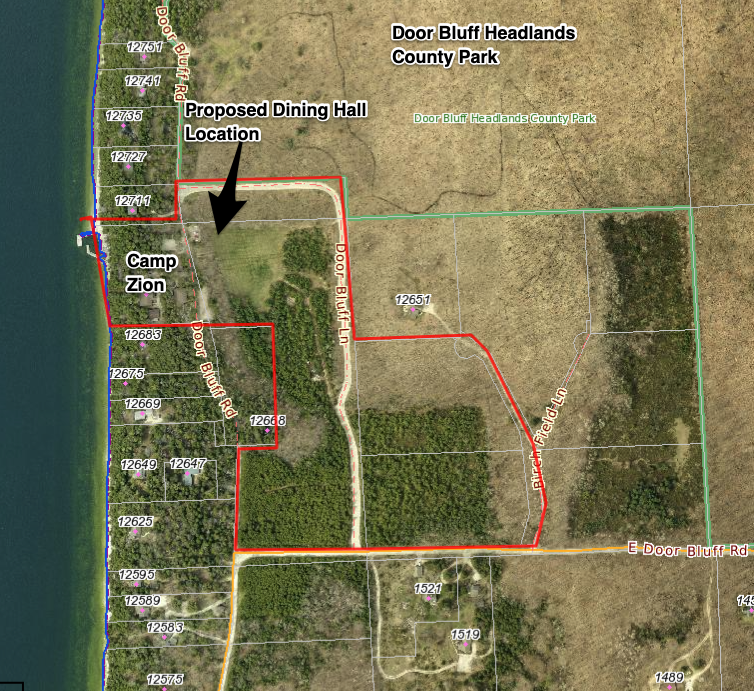
The desired location would snug the building close to a slope and into the edge of the woods, blending it into the contour of the landscape. By moving it closer, it would also allow for a short bridge off the slope for handicap accessibility to the second floor dining hall. The bulk of the camp’s living quarters, offices, and activity centers are located a short walk across a private road that bisects the camp property.
“It’s an important part of the camp experience that we can all dine together,” Stewart said. “We can’t do that now.”
The property is zoned for camp and institutional use, has a full capacity of 140 campers and typically hosts about 1,500 campers a year.
Complicating matters further is the fact that the setback required is a setback from a private road, Door Bluff Road, that bisects the Camp Zion property that is used by the camp and nine property owners to the north of the camp. Camp Zion constructed a new road, Door Bluff Lane, to provide access to those nine parcels and offered to maintain it for 20 years if those property owners abandoned rights to Door Bluff Road, but neighbors did not agree.
County zoning and state law require that a petitioner prove one of two things when seeking a variance: that denial of the request would unreasonably prevent the owner from using the property for a permitted purpose, or that conformity with regulations is unnecessarily burdensome.
In this case, Camp Zion owns 31 adjoining acres, giving it ample room to move the building location on the same property and conform to the zoning code. Camp Zion argues that by moving the building it would make it burdensome and costly to comply with the Americans with Disabilities Act (ADA).
“Ninety-eight percent of the reason for this location is for ADA accessibility,” Stewart said. “By putting it there, it makes sense –– it’s less visible, it makes for a shorter ADA ramp, and eliminates the need to go all the way around the edge of the property to access it.”
In its deliberations, members of the Door County Board of Adjustment suggested locating the building elsewhere and transporting handicapped campers with a van. Stewart said that would require them to purchase the van and pay a trained driver, something he says is costly and not realistic for the camp to do. He also said doing so would separate handicapped individuals from the experience of the rest of the campers.
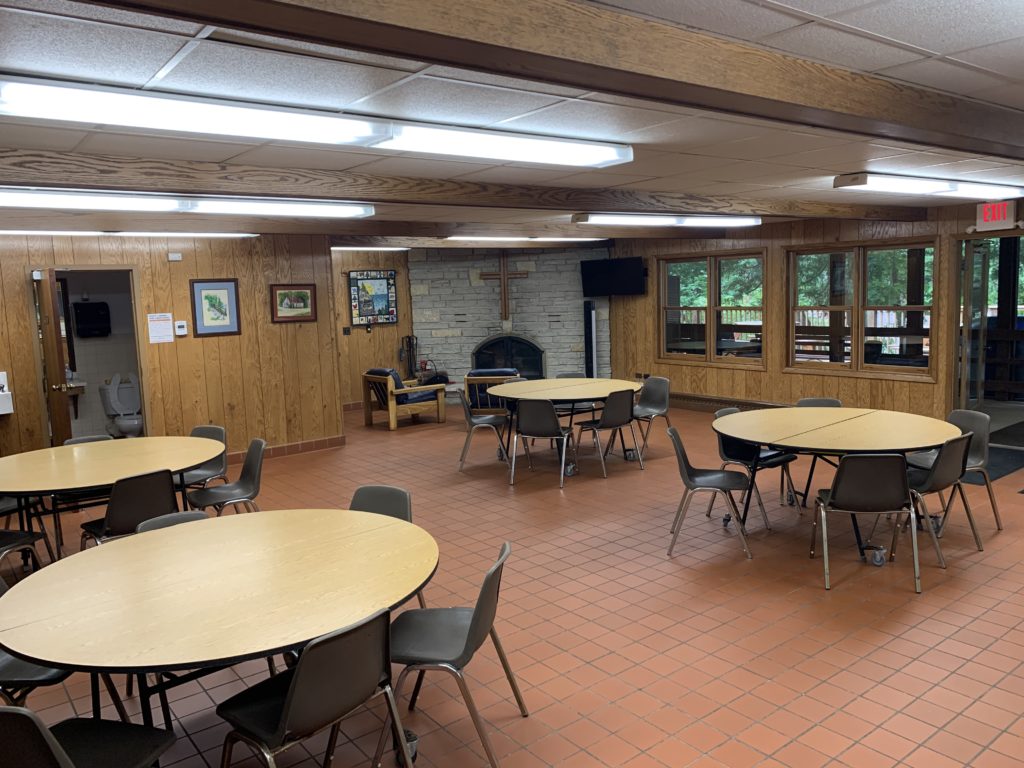
In 2015 Camp Zion proposed a new dining hall on the other water side of the road closer to its existing facilities, but that plan was rejected when several neighbors objected.
“In our view, the county created the hardship when they turned down what would have been a handicap-accessible building on that property in 2015,” Stewart said. “By telling us to move it somewhere else, we had no options but to go across the street and down the hill.”
Stewart said Camp Zion has spent at least $300,000 over the last 20 years planning the new dining hall, acquiring adjacent land, and building the new road.
Many of those same neighbors who fought the 2015 proposal have objected to the new location out of fear it will lead to more traffic and further expansion of the facility. Some of them declined comment because of the legal proceedings.
Natalie and Ned Nedderson live about eight houses away from Camp Zion on the end of Door Bluff Road and consider themselves neutral about the proposal. They said there’s no malice on the part of the neighbors, but concern about an effort to preserve the privacy that drew them to the area that borders Door Bluff Headlands County Park.
“I feel like it’s probably inevitable that they build something there,” Natalie Nedderson said. “We appreciate the camp for what it is – a camp for kids. But I think a lot of us fear mission creep. Is it a camp or a retreat center? A wedding venue and retreat center is much different from a kid’s camp.”
Stewart, who first came to the camp as a kid and has served as its director since 2000, said there are no plans at present for further expansion, but acknowledges the concern.
“My answers to that don’t carry legal might, but everything we would do would be subject to a Conditional Use Permit as well,” he said.
LISTEN: Andrew Kleidon and Myles Dannhausen Jr. discuss the project further on this week’s Door County Pulse Podcast.



